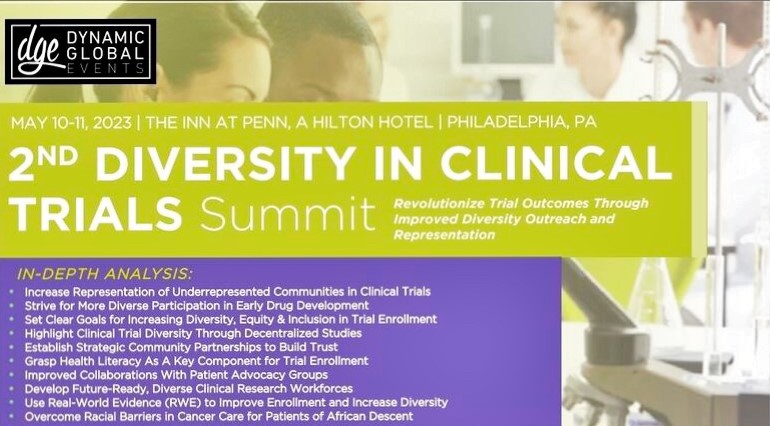How Do You Really Advance Diversity in Clinical Trials?

Blog by Monique French, MPH, Senior Director, Patient Advocacy, Health Policy & Communications, at Rx4good
I recently attended the 2nd Diversity in Clinical Trials Summit, where leaders across the pharmaceutical industry gathered to discuss and ideate solutions to enhance clinical trial diversity and representation. With Juneteenth this past Monday, I wanted to reflect on the experience and share some thoughts that could aid in our continued efforts to address the inclusion of systematically excluded populations in clinical trials. Here are a few:
- Political Determinants Affect Health Equity: We’ve spent significant resources to understand social determinants of health and their impact on clinical trial diversity. However, we’ve spent far less time examining the implications of political determinants of health. Public health leader and author Daniel Dawes explains this concept as “the systematic process of structuring relationships, distributing resources, and administering power, operating simultaneously in ways that mutually reinforce or influence one another to shape opportunities that either advance health equity or exacerbate health inequities.” Political decision-making impacts a community’s ability to access healthcare, including clinical trials. For example, transportation remains a top barrier in clinical trial participation. Solutions have ranged from gas cards to rideshare vouchers or reimbursement. But maybe we are tackling this barrier the wrong way, placing a Band-aid on the issue and not addressing the root cause: inadequate transportation that exists within the communities we want to reach, governed by local, state, and federal bodies.
- Language Matters: When communicating with potential clinical trial participants, are we considering what we say and how we say it? The language we use is important in the recruitment of diverse individuals to clinical trials but also to their understanding of what they are potentially participating in. Nationally, only 12% of adults have proficient health literacy skills, according to the 2003 National Assessment of Adult Literacy, resulting in most of the population’s inability to comprehend complex descriptions of clinical research, given the average consent form is 20 pages long. Additionally, the use of terms such as “marginalized” or “underrepresented” continues to misrepresent the experience of diverse populations that have been subject to oppressive practices. Current best practices reframe the experience appropriately using terms such as “systematically excluded,” for example. Language matters in ensuring equitable access, so we need to continually check and recheck our approach when discussing and communicating with diverse populations.
- Authenticity Is Critical: Lastly, are we truly building authentic relationships within the communities we serve? Do we pop in when the time is convenient for our organizations and then leave when there is no longer a benefit or business justification? It’s important to remember our “why.” Many organizations, including Rx4good, pledge to keep the patient at the center of all we do. To remain true to that commitment means forming genuine relationships and taking the time to truly understand the needs of the community before defaulting to another educational brochure or program.
Listen, Process, Act, Assess
How can we foster bi-directional opportunities that provide communities a pathway for long-lasting, impactful change? This begins by coming to the table to listen, hear, and comprehend what is truly occurring in a particular population. It is understanding the journey of the whole person who experiences a disease—not just what they may encounter as a patient. Their journey as an individual and as part of a community directly affects their ability to navigate complex health systems as a patient. Let’s take the time to comprehend the full picture of the communities we serve by jointly uncovering barriers and co-developing impactful solutions.
As we enter the second half of the year, let’s make space to evaluate the goals and objectives we’ve set forth to advance our shared mission of achieving clinical trial diversity. We must all do our parts to work toward removing systemic barriers, ensuring culturally appropriate communication, and building sustainable partnerships. Change requires that each one of us speak up and bring our lived experiences, to the table to foster a society that is truly equitable every day, where we no longer need to convene for solutions around diversity.

Monique French, MPH, serves as Senior Director, Advocacy, at Rx4good. She provides strategic support and counsel for patient advocacy and has profound knowledge of patient advocacy organizations and engagement.
